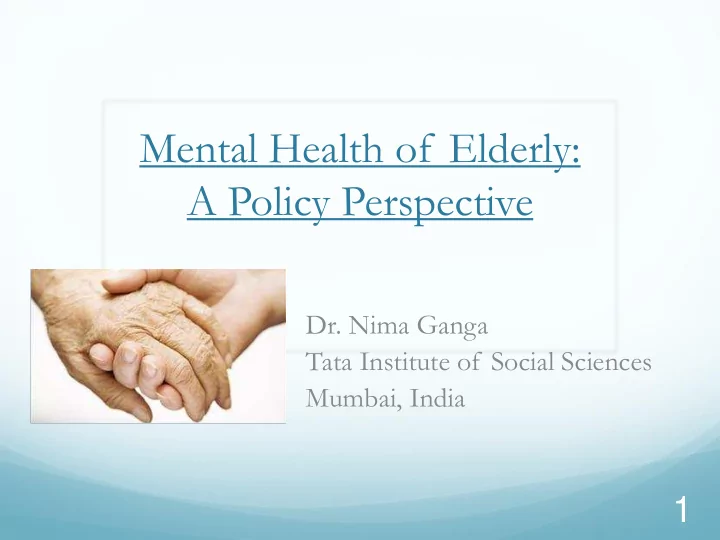

Mental Health of Elderly: A Policy Perspective Dr. Nima Ganga Tata Institute of Social Sciences Mumbai, India 1
WHO: There is no health without mental health Mental health is not merely the absence of mental illness A life course approach: Promoting mental health should be part of promoting healthy ageing. A change in perspective to focus on an upstream approach is needed in mental health. 2
Good mental health is a life long asset to thrive in life 1. Promote better mental health -Coping skills, strong family and social bonding, active interests, financial backup – all these have a good bearing on mental health and will ensure a better later life too. -Healthy aged people actively involve in nation building and provide mentoring support to younger generations. -Change our perspective from “providing” service for a “disabled population” 3
Mental Health issues of elderly 2. Treat mental disorders Organic age related disorders and non organic mental disorders Mental disorders are just as treatable as any physical disorders - ensure accessible and appropriate mental health care is just one part of the spectrum of mental health care. - Availability of care- Often neglected - Stigma makes mental health parity laws difficult to implement - The limited mental health services available are drastically underutilized by elderly - Co-morbidity 4
Models of care More than a biomedical approach - Alternative policy approaches under population health model for mental health care of elderly people Policy can intervene in multiple determinants of health – effect on the whole population 5
Mental health in Elderly Policy Including mental health in elderly policy is an essential first step to ensure better health and quality of life of any elderly population. Support healthy ageing through policy changes or policy enactment. And, improving the condition of elderly mentally ill throughout the developing world emphasizes positive options for policy makers. 6
Policy situation in developed and developing countries In societies where nuclear families were more prevalent and changes were slower, institutional care resources and social security helped the aged to live independently from their families. But, the rapid social changes happened in the developing world did not allow to create alternative care mechanisms for elderly care. 7
Appropriateness of types of care Reduced social participation, loss of dignity and self-respect eventually weakens the social and family support of an individual resulting in declining mental health. However, in many developing countries, elderly in the community enjoyed better social support than those in the institutions. We still have to understand efficient models of formal care systems in traditional societies. 8
Action plan: The policy framework should be able to transform and improve the lives of older people, by ensuring good mental health and addressing mental health issues alike. Enhance intellectual, social, and emotional well- being. Mental health and aging should be one of the top issues coming out of this conference. 9
Elderly policy and mental health Any successful policy effort will be preceded by focused education and collaborative efforts to advocate successfully for appropriate services. Policies should facilitate the ability of families to provide care Support formal care for those who doesn’t have the safety of family care Programs should serve the elderly's physical and mental health care needs simultaneously 10
Policy supporting informal care Direct ways to reinforce family care through policies Housing and social policies to encourage multi- generational families E.g., Singapore, Malaysia, Korea, Lesotho and Botswana In more subtle ways, government can support employer sponsored benefits like time off work to care givers, income tax relief or govt. support to NGOs to provide elderly care to childless elderly. 11
Policy on long term Care Social security systems to complement traditional intergenerational support Institutionalized care should have strong community links – can be a cooperative run by the residents Remarriage, employment opportunities for the elderly – all these contribute to better mental health Anything that diminishes older people's social and economic marginality, such as a pension, is likely to help reduce the prevalence of psychiatric morbidity 12
Policy to address the treatment gap Integrating mental health needs into the formal health care system from community health centers to acute care hospitals- HR needs Community health workers (CHWs) trained in geriatric psychiatry Policy makers must anticipate not only the needs of the older population but also how to remove the barriers in meeting them 13
Research - Optimal policies for each country will vary and cannot be generalized - develop policies that are realistic and locally determined. - The stereotype beliefs of modern and traditional societies can result in inappropriate policy ideas- E.g., families in developing countries are more inclined to care for the aged can be wrong and lead to inappropriate policy ideas. - Ensure marginalized and under studied populations are also included. 14
Conclusion Multifaceted approach in policy formulation and implementation Reliable support system enhance the quality of life Mentally healthy ageing – the society ensures an enjoyable and fulfilling later life 15
References Pachana, NA. A Global Snapshot of Mental Health Issues, Services, and Policy. Journal of the American Society on Aging 37(1) (2013)27-32 . Parkar SR. Elderly mental health needs. Mens Sana Monogr. 13(1) (2015) 91 – 99. Levkoff Sue E, Macarthur Ian W, Bucknall J. Elderly mental health in the developing world. Social Sciences and Medicine 41(7)(1995) 983-1003. Grundy, E. Ageing and vulnerable elderly people: European perspectives. Ageing & Society 26 (2006) 105 – 134. Robinson, KM. Policy Issues in Mental Health Among the Elderly. Nurs Clin N Am 45 (2010) 627 – 634. Singh, R and Upadhyay, A. Mental Health of Elderly People. Journal of Psychosocial Research 9(1) (2014) 61-70 Elderly Policy – Ghana, Portugal, Mexico, Pakistan, India, China, Thailand, South Africa, Kenya, Nigeria, Mali & Vietnam 16
Recommend
More recommend